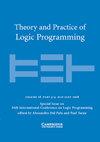超越加权模型计数的高效知识汇编
IF 1.1
2区 数学
Q3 COMPUTER SCIENCE, SOFTWARE ENGINEERING
引用次数: 1
摘要
逻辑规划的定量扩展通常需要解决所谓的第二级推理任务,即在加法和乘法之上涉及第三种运算的问题,例如最大化或归一化,从而超越了分布语义下概率逻辑规划中众所周知的加权或代数模型计数设置。我们引入了二级代数模型计数(2AMC)作为这类问题的通用框架。由于2AMC是一个(代数)模型,而forall-exists-SAT是一个命题可满足性模型,因此它是出了名的难以求解。基于知识编译(KC)的第一级技术通过对结果电路施加可变顺序约束而适应于特定的2AMC实例。然而,这些限制会严重增加电路尺寸,从而降低这种方法的效率。我们表明,我们可以利用2AMC问题的逻辑结构来省略这些约束的一部分,从而限制负面影响。此外,我们引入并实施了一种策略,静态地生成足够的约束集,并先验地保证了KC的性能。我们对几个基准和任务的实证评估证实了我们的理论结果可以转化为实践中更有效的求解。本文章由计算机程序翻译,如有差异,请以英文原文为准。
Efficient Knowledge Compilation Beyond Weighted Model Counting
Abstract Quantitative extensions of logic programming often require the solution of so called second level inference tasks, that is, problems that involve a third operation, such as maximization or normalization, on top of addition and multiplication, and thus go beyond the well-known weighted or algebraic model counting setting of probabilistic logic programming under the distribution semantics. We introduce Second Level Algebraic Model Counting (2AMC) as a generic framework for these kinds of problems. As 2AMC is to (algebraic) model counting what forall-exists-SAT is to propositional satisfiability, it is notoriously hard to solve. First level techniques based on Knowledge Compilation (KC) have been adapted for specific 2AMC instances by imposing variable order constraints on the resulting circuit. However, those constraints can severely increase the circuit size and thus decrease the efficiency of such approaches. We show that we can exploit the logical structure of a 2AMC problem to omit parts of these constraints, thus limiting the negative effect. Furthermore, we introduce and implement a strategy to generate a sufficient set of constraints statically, with a priori guarantees for the performance of KC. Our empirical evaluation on several benchmarks and tasks confirms that our theoretical results can translate into more efficient solving in practice.
求助全文
通过发布文献求助,成功后即可免费获取论文全文。
去求助
来源期刊

Theory and Practice of Logic Programming
工程技术-计算机:理论方法
CiteScore
4.50
自引率
21.40%
发文量
40
审稿时长
>12 weeks
期刊介绍:
Theory and Practice of Logic Programming emphasises both the theory and practice of logic programming. Logic programming applies to all areas of artificial intelligence and computer science and is fundamental to them. Among the topics covered are AI applications that use logic programming, logic programming methodologies, specification, analysis and verification of systems, inductive logic programming, multi-relational data mining, natural language processing, knowledge representation, non-monotonic reasoning, semantic web reasoning, databases, implementations and architectures and constraint logic programming.
 求助内容:
求助内容: 应助结果提醒方式:
应助结果提醒方式:


